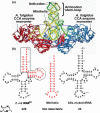CCA addition to tRNA: implications for tRNA quality control
- PMID: 20101632
- PMCID: PMC2848691
- DOI: 10.1002/iub.301
CCA addition to tRNA: implications for tRNA quality control
Abstract
The CCA sequence is conserved at the 3' end of all mature tRNA molecules to function as the site of amino acid attachment. This sequence is acquired and maintained by stepwise nucleotide addition by the ubiquitous CCA enzyme, which is an unusual RNA polymerase that does not use a nucleic acid template for nucleotide addition. Crystal structural work has divided CCA enzymes into two structurally distinct classes, which differ in the mechanism of template-independent nucleotide selection. Recent kinetic work of the class II E. coli CCA enzyme has demonstrated a rapid and uniform rate constant for the chemistry of nucleotide addition at each step of CCA synthesis, although the enzyme uses different determinants to control the rate of each step. Importantly, the kinetic work reveals that, at each step of CCA synthesis, E. coli CCA enzyme has an innate ability to discriminate against tRNA backbone damage. This discrimination suggests the possibility of a previously unrecognized quality control mechanism that would prevent damaged tRNA from CCA maturation and from entering the ribosome machinery of protein synthesis. This quality control is relevant to cellular stress conditions that damage tRNA backbone and predicts a role of CCA addition in stress response.
Figures




References
-
- Korostelev A, Trakhanov S, Laurberg M, Noller HF. Crystal structure of a 70S ribosome-tRNA complex reveals functional interactions and rearrangements. Cell. 2006;126:1065–1077. - PubMed
-
- Tomari Y, Hino N, Nagaike T, Suzuki T, Ueda T. Decreased CCA-addition in human mitochondrial tRNAs bearing a pathogenic A4317G or A10044G mutation. J Biol Chem. 2003;278:16828–16833. - PubMed
-
- Levinger L, Oestreich I, Florentz C, Morl M. A pathogenesis-associated mutation in human mitochondrial tRNALeu(UUR) leads to reduced 3'-end processing and CCA addition. J Mol Biol. 2004;337:535–544. - PubMed
Publication types
MeSH terms
Substances
Grants and funding
LinkOut - more resources
Full Text Sources
Molecular Biology Databases

